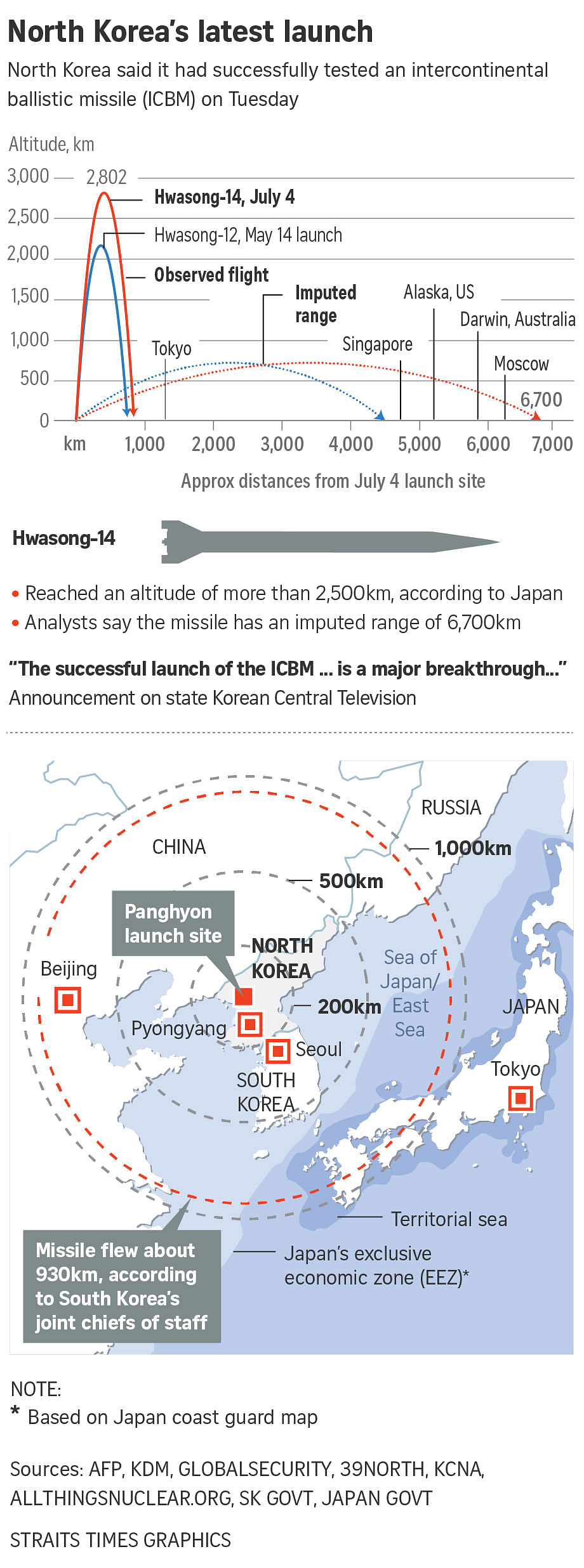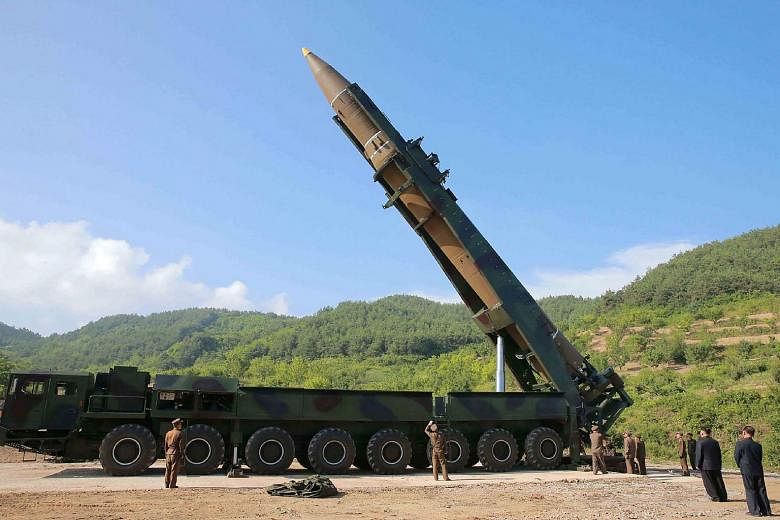SEOUL - North Korea has declared itself a "full-fledged nuclear power" after successfully testing what it claims to be an intercontinental ballistic missile (ICBM) capable of hitting any target in the world.
Major powers have yet to confirm the claim but the test on Tuesday (July 4) immediately drew international condemnation. Analysts warn against giving Pyongyang too much credit, but noted that it has accelerated its nuclear programme to realise leader Kim Jong Un's New Year's Day pledge of an ICBM that can strike the United States.
The official Korean Central News Agency (KCNA) reported that Mr Kim witnessed the launch of the Hwasong-14 missile, which reached an altitude of 2,802km and flew 933km for 39 minutes before landing in waters between the two Koreas and Japan.
The test is the "final gateway" for North Korea to complete its nuclear programme, and a "phenomenal event in history", KCNA added.
The latest provocation came after South Korean President Moon Jae In met his US counterpart Donald Trump in Washington, and days before they meet other world leaders including Chinese President Xi Jinping and Japan's Prime Minister Shinzo Abe at a Group of 20 summit meeting in Hamburg, Germany.
Mr Abe said it "clearly shows the threat has grown" and that Japan, South Korea and the US would discuss the issue later this week.

Many believe it was no coincident that the missile launch took place on July 4, which is Independence Day in the US. An exasperated Mr Trump, in a Twitter post, urged China to act "end this nonsense once and for all!"
In Beijing, the Foreign Ministry urged Pyongyang to refrain from acts that violate United Nations Security Council resolutions "so as to create necessary conditions for resuming dialogue".
Mr Moon, who has advocated dialogue with North Korea alongside sanctions, urged the regime not to "cross the point of no return". He told national security officials to work on counter measures, assuming the missile could be an ICBM.
Though the ICBM claim cannot be verified yet, some experts are already saying that the missile's flight path suggests it could be an ICBM, which can travel at least 5,500km.
Dr David Wright, a senior scientist at the US-based non-profit organisation Union of Concerned Scientists, told The Straits Times that the long flight time of nearly 40 minutes signals that the missile was "fired almost straight up on a very lofted trajectory".
On a standard trajectory, the same missile could travel 6,700km, allowing it to hit Alaska in northwest North America. "If this range estimate is right, this would be considered an ICBM," he said.
Analysts in South Korea, however, are careful not to legitimise North Korea's claim too early.
Dr Bong Young Shik of Yonsei University's Institute for North Korean Studies said a missile that flew almost 1,000km does not prove that North Korea has an ICBM.
"We don't want to make too much out of it... This is North Korea's way of sending a tough message to the US and South Korea that it will not bow to pressure," he said.
Japanese defence and security expert Tosh Minohara from Kobe University saw the launch as Mr Kim's way of showing defiance after Mr Trump said last week that US patience with the North is over.
"I think Kim Jong Un is just picking the wrong fight with the wrong guy and by doing this, it may risk alienating China," he added.
Other analysts say there may be room for dialogue now that North Korea believes its nuclear capability is a strong bargaining chip.
Said Sogang University's international relations professor Kim Jae Chun: "If it is really a successful ICBM test, they can actually declare a moratorium on further testing in return for a halt in joint (US-South Korea) military exercises and reduction in American strategic assets surrounding the Korean Peninsula.
"They might signal they are ready to talk, as long as we don't touch their existing capability."


